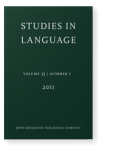Vol. 35:1 (2011) ► pp.112–127
Reflexive nominal compounds
This paper presents a detailed analysis of reflexive nominal compounds like self-assessment in English and their counterparts in nine other languages, whose number and use has strongly increased in these languages over the last several decades. The first component of these compounds is shown to be related to intensifiers like selbst in German and its cognate form self- in English, whose multiple uses also underlie different semantic types of reflexive compounds (self-help vs. self-control), whereas the second component typically derives from transitive verbs. Among the central problems discussed in this paper are the question of the productivity of these compounds and the possibility of deriving their meaning in a compositional fashion. The parameters of variation manifested by the sample of languages under comparison in this pilot study concern inter alia the form of the intensifier (native or borrowed, one or two), the semantic type, and the lexical category of the resultant compound.
Cited by
Cited by 4 other publications
This list is based on CrossRef data as of 14 april 2024. Please note that it may not be complete. Sources presented here have been supplied by the respective publishers. Any errors therein should be reported to them.
